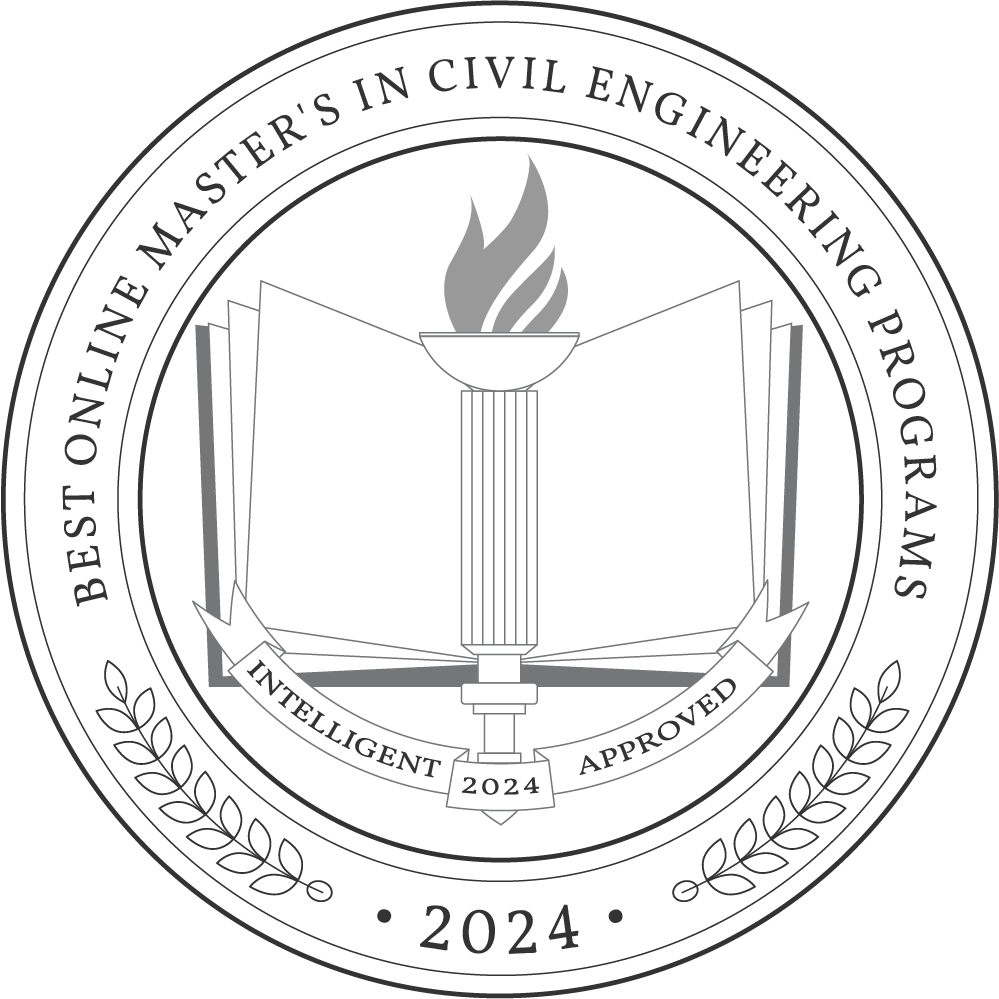An online master’s in civil engineering will prepare students to plan, build, and repair critical infrastructure like bridges, roadways, buildings, and more.
Most online civil engineering graduate programs take two to three years to complete, although some universities offer an accelerated one-year program. The best online master’s in civil engineering programs require between 36 and 42 credit hours.
Civil engineers earn an average salary of $95,890. The career paths in this industry include geotechnical engineer, structural engineer, construction manager, and urban planner. According to the National Center for Education Statistics, the average tuition for graduate school is $12,596 per year at public universities and $28,017 per year at private institutions.
How to Choose an Online Master’s in Civil Engineering Program
Choose your area of study
First, you’ll need to decide whether you want to earn a Master of Engineering or Master of Science for your civil engineering degree. Also, many programs allow you to select a concentration and focus your studies on a particular niche in this field, such as construction, public works, transportation, or geo-technological engineering.
When choosing an online master’s in civil engineering program, ask yourself the following questions:
- Do you want to work in an office, outdoors, or both?
- Which area is most in demand?
- Which courses interest you the most?
- What are the education requirements for the career you want?
- What concentration matches your skill set?
Once you have a better idea of what you want to do after you graduate, look for programs that closely match these career goals.
Research schools and programs
You should only apply to institutions that have been approved by a DOE-recognized regional accrediting organization, such as the New England Commission of Higher Education or Northwest Commission on Colleges and Universities. These organizations evaluate schools to ensure they provide students with a high-quality education. Those who attend a school that isn’t regionally accredited may be unable to access financial aid or transfer credits to another institution if needed.
Ideally, your master’s in civil engineering program will also be accredited by a respected industry group like the Accreditation Board for Engineering and Technology (ABET). This programmatic accrediting organization has particularly high standards for engineering education.
For each option you consider, find the answers to the following questions:
- What is the cost of the program?
- What student support services are available?
- What are the faculty members’ credentials?
- What are the graduation requirements?
To learn more about any schools that you’re interested in, you can visit the school’s website, contact an admissions counselor, follow the school on social media, or attend an in-person or virtual open house.
Prepare for tests and applications
Students should create a spreadsheet, checklist, or both to help them stay organized during the application and admission process. Application requirements vary by school and program, but common items typically include the following:
- Graduate Record Exam (GRE) test scores
- Transcripts from a bachelor’s degree program
- Proof of undergraduate GPA
- Letters of recommendation
- Personal statement or essay
- Resume or curriculum vitae
Before submitting an application, always contact an admissions counselor to ensure you have the most accurate information regarding requirements and deadlines.
Select your program
While it may be tempting to apply to many different schools, try to narrow the options to a few to save money on application fees unless you can get an application fee waiver.
Before making your final decision, review your needs and goals again. Do you plan to attend school full-time or part-time? Do you want your program to be as online as possible, or are you fine with a hybrid program that has a fair amount of in-person requirements? Some programs offer asynchronous courses, which can be completed at your own pace, while others only offer synchronous courses, which involve remotely attending lectures and completing assignments at the same time as other students — which of these two online learning formats do you prefer? Your school should accommodate your scheduling needs and learning preferences.
Determine how you’ll pay for your degree
Students may not know there are numerous ways to pay for an online master’s in civil engineering program. Adult learners working full-time while attending a master’s degree program can talk to their employers about tuition reimbursement opportunities.
Students can use the IRS Tax Assistant tool to determine eligibility for education tax benefits. Other resources for financial aid include the following:
- Free Application for Federal Student Aid (FAFSA)
- School, government, and community grants, loans, and scholarships
- Work-study programs
- Fellowships or assistantships
- Co-op programs
Be sure to speak to financial aid counselors at the schools you’re interested in for the most accurate and specific information about program cost.
Best 37 Accredited Online Master's in Civil Engineering Programs
Institution Type
Status
- Intelligent Score
- Alphabetically By University Name
- Acceptance Rate
- Enrollment
- In-state Graduate Tuition
- Out-of-state Graduate Tuition
- In-state Undergraduate Tuition
- Out-of-state Undergraduate Tuition

University of Illinois Urbana-Champaign
Intelligent Score: 99.15Undergraduate Tuition
In-state: $14,317
Out-of-state: $33,824
Graduate Tuition
In-state: $15,016
Out-of-state: $15,016
Test scores
SAT: 1200-1460
ACT: 27-33
ESTIMATED COST PER CREDIT
$1,110
DELIVERY FORMAT
Online, On-Campus, Blended
ACCREDITATION
Higher Learning Commission
REQUIRED CREDITS TO GRADUATE
36

Johns Hopkins Engineering for Professionals
Intelligent Score: 97.36Undergraduate Tuition
In-state: $54,160
Out-of-state: $54,160
Graduate Tuition
In-state: $57,010
Out-of-state: $57,010
Test scores
SAT: 1470-1560
ACT: 34-36
ESTIMATED COST PER CREDIT
$1,640
DELIVERY FORMAT
Online, On-Campus, Hybrid
ACCREDITATION
Middle States Commission on Higher Education
REQUIRED CREDITS TO GRADUATE
30

NC State University
Intelligent Score: 96.15Undergraduate Tuition
In-state: $6,535
Out-of-state: $26,654
Graduate Tuition
In-state: $9,095
Out-of-state: $9,095
Test scores
SAT: 1230-1410
ACT: 27-32
ESTIMATED COST PER CREDIT
Resident: $505
Non-Resident: $1,572
DELIVERY FORMAT
Online
ACCREDITATION
Southern Association of Colleges and Schools Commission on Colleges
REQUIRED CREDITS TO GRADUATE
30

Purdue University
Intelligent Score: 95.24Undergraduate Tuition
In-state: $9,208
Out-of-state: $28,010
Graduate Tuition
In-state: $9,208
Out-of-state: $9,208
Test scores
SAT: 1170-1420
ACT: 25-33
ESTIMATED COST PER CREDIT
$750
DELIVERY FORMAT
Online, On-Campus
ACCREDITATION
Engineering Accreditation Commission of ABET
REQUIRED CREDITS TO GRADUATE
30

Columbia University Engineering
Intelligent Score: 94.64Undergraduate Tuition
In-state: $57,864
Out-of-state: $57,864
Graduate Tuition
In-state: $49,024
Out-of-state: $49,024
Test scores
SAT: 1460-1570
ACT: 33-35
ESTIMATED COST PER CREDIT
$2,362
DELIVERY FORMAT
Online
ACCREDITATION
Middle States Commission on Higher Education
REQUIRED CREDITS TO GRADUATE
30

UVA Engineering
Intelligent Score: 94.58Undergraduate Tuition
In-state: $15,772
Out-of-state: $49,819
Graduate Tuition
In-state: $17,076
Out-of-state: $17,076
Test scores
SAT: 1320-1510
ACT: 30-34
ESTIMATED COST PER CREDIT
In-State: $781
Out-of-State: $1,456
DELIVERY FORMAT
Online
ACCREDITATION
Southern Association of Colleges and Schools Commission on Colleges
REQUIRED CREDITS TO GRADUATE
30

Auburn University
Intelligent Score: 93.97Undergraduate Tuition
In-state: $10,080
Out-of-state: $30,240
Graduate Tuition
In-state: $10,080
Out-of-state: $10,080
Test scores
SAT: 1160-1320
ACT: 25-31
ESTIMATED COST PER CREDIT
$949
DELIVERY FORMAT
Online
ACCREDITATION
Southern Association of Colleges and Schools Commission on Colleges
REQUIRED CREDITS TO GRADUATE
30

UW College of Engineering
Intelligent Score: 93.49Undergraduate Tuition
In-state: $10,629
Out-of-state: $37,998
Graduate Tuition
In-state: $16,278
Out-of-state: $16,278
Test scores
SAT: 1200-1453
ACT: 27-33
ESTIMATED COST PER CREDIT
$684
DELIVERY FORMAT
Online, On-Campus, Hybrid
ACCREDITATION
Northwest Commission on Colleges and Universities
REQUIRED CREDITS TO GRADUATE
30

University of Wisconsin at Madison
Intelligent Score: 93.42Undergraduate Tuition
In-state: $9,273
Out-of-state: $37,161
Graduate Tuition
In-state: $10,728
Out-of-state: $10,728
Test scores
SAT: 1260-1460
ACT: 27-32
ESTIMATED COST PER CREDIT
$1,300
DELIVERY FORMAT
Online, On-Campus
ACCREDITATION
Higher Learning Commission
REQUIRED CREDITS TO GRADUATE
30

University of Southern California
Intelligent Score: 92.16Undergraduate Tuition
In-state: $59,260
Out-of-state: $59,260
Graduate Tuition
In-state: $47,880
Out-of-state: $47,880
Test scores
SAT: 1340-1530
ACT: 30-34
ESTIMATED COST PER CREDIT
$2,309
DELIVERY FORMAT
Online, On-Campus
ACCREDITATION
Western Association of Schools and Colleges Senior College and University Commission
REQUIRED CREDITS TO GRADUATE
30-32

Missouri University of Science and Technology
Intelligent Score: 91.85Undergraduate Tuition
In-state: $9,330
Out-of-state: $28,563
Graduate Tuition
In-state: $10,452
Out-of-state: $10,452
Test scores
SAT: 1238-1390
ACT: 26-31
ESTIMATED COST PER CREDIT
$1,200
DELIVERY FORMAT
Online
ACCREDITATION
Higher Learning Commission
REQUIRED CREDITS TO GRADUATE
30

Kansas State University
Intelligent Score: 90.95Undergraduate Tuition
In-state: $9,375
Out-of-state: $25,251
Graduate Tuition
In-state: $10,212
Out-of-state: $10,212
Test scores
SAT: N/A
ACT: N/A
ESTIMATED COST PER CREDIT
$800
DELIVERY FORMAT
Online
ACCREDITATION
Higher Learning Commission
REQUIRED CREDITS TO GRADUATE
30

Texas Tech University
Intelligent Score: 90.72Undergraduate Tuition
In-state: $8,683
Out-of-state: $20,953
Graduate Tuition
In-state: $6,788
Out-of-state: $6,788
Test scores
SAT: 1070-1240
ACT: 22-27
ESTIMATED COST PER CREDIT
Resident: $665
Non-Resident: $1,167
DELIVERY FORMAT
Online
ACCREDITATION
Southern Association of Colleges and Schools Commission on Colleges
REQUIRED CREDITS TO GRADUATE
30

Ohio University
Intelligent Score: 90.66Undergraduate Tuition
In-state: $27,574
Out-of-state: $38,254
Graduate Tuition
In-state: $18,138
Out-of-state: $18,138
Test scores
SAT: 1070-1290
ACT: 22-27
ESTIMATED COST PER CREDIT
In-State: $840
Out-of-State: $859
DELIVERY FORMAT
Online
ACCREDITATION
Higher Learning Commission
REQUIRED CREDITS TO GRADUATE
32

University of Tennessee, Knoxville
Intelligent Score: 90.28Undergraduate Tuition
In-state: $11,332
Out-of-state: $28,522
Graduate Tuition
In-state: $11,468
Out-of-state: $11,468
Test scores
SAT: 1140-1303
ACT: 25-31
ESTIMATED COST PER CREDIT
In-State: $815
Out-of-State: $890
DELIVERY FORMAT
Online
ACCREDITATION
Southern Association of Colleges and Schools Commission on Colleges
REQUIRED CREDITS TO GRADUATE
30

Villanova University
Intelligent Score: 90.17Undergraduate Tuition
In-state: $56,730
Out-of-state: $56,730
Graduate Tuition
In-state: $20,619
Out-of-state: $20,619
Test scores
SAT: 1320-1460
ACT: 30-33
ESTIMATED COST PER CREDIT
$1,541
DELIVERY FORMAT
Online, Hybrid
ACCREDITATION
Middle States Commission on Higher Education
REQUIRED CREDITS TO GRADUATE
30

Mississippi State University
Intelligent Score: 89.88Undergraduate Tuition
In-state: $8,800
Out-of-state: $23,840
Graduate Tuition
In-state: $8,800
Out-of-state: $8,800
Test scores
SAT: 1050-1270
ACT: 22-30
ESTIMATED COST PER CREDIT
$514
DELIVERY FORMAT
Online
ACCREDITATION
Southern Association of Colleges and Schools Commission on Colleges
REQUIRED CREDITS TO GRADUATE
30-33

Colorado State University
Intelligent Score: 89.14Undergraduate Tuition
In-state: $9,426
Out-of-state: $28,147
Graduate Tuition
In-state: $10,520
Out-of-state: $10,520
Test scores
SAT: 1070-1280
ACT: 23-29
ESTIMATED COST PER CREDIT
$993
DELIVERY FORMAT
Online
ACCREDITATION
Higher Learning Commission
REQUIRED CREDITS TO GRADUATE
30
How We Rank Schools
For this list, we focused on master’s degrees in civil engineering. The most common types of graduate degrees offered in civil engineering are a Master of Science (MS) and a Master of Engineering (MEng).
Another criterion for this list was that coursework is offered completely or primarily online so that students can access these programs regardless of their schedules or geographic locations.
As an additional measure of quality, we only included schools that are regionally accredited. This confirms that they meet high standards for postsecondary education. Many of these programs also have programmatic accreditation through ABET, an engineering and technology program accrediting body.
Once we narrowed our list of programs, we reviewed each of them on the basis of outcomes, reputation, faculty, flexibility, and cost. We then calculated the Intelligent Score for each program on a scale of 0 to 100. For a more extensive explanation, check out Our Ranking Methodology.
What Can You Expect from an Online Master’s in Civil Engineering Program?
Students in the best online master’s in civil engineering programs must complete all required credit hours (this figure tends to range from 30 to 42 credits). Full-time students usually complete the program in two years.
Part-time students need extra time to complete the program, typically three years. All students will study higher-level leadership, management, cost analysis, project planning, engineering technology, statistics, design, planning, and development courses.
Students will participate in core classes, electives, research, and practicums. Some schools integrate co-op opportunities and internships, while others require a research-based thesis or final project, sometimes called capstone projects.
Potential courses you’ll take in an online master’s in civil engineering program
- The History of Engineering Materials. Students will learn about the various construction materials utilized in the past and today. Materials studied may include concrete, metals, and more.
- Codes and Regulations. Engineers must strictly follow codes and regulations and apply them to every job. Students will learn the most common codes used for building structures, transportation, and safety.
- Engineering in Waterways. Students learn the issues with building structures along waterways and strategies for designing safe, sturdy, and efficient systems. Building in, on, and around water systems requires specific expertise. When planning projects, they must consider future issues, such as climate change and rising water levels.
- Transportation Planning and Design. This class focuses on teaching students about the many transportation engineering factors, including planning, constructing, operating, and maintaining systems. Students discuss issues regarding railways, highways, backroads, airports, and other transportation modes.
- Computational Methods. Students learn to solve problems using today’s tools, including computer programs, structural analysis, biomechanics, algorithms, and linear systems. Geotechnics is a section in this course but may also be offered as a complete course for deeper study. Geotechnical engineering is using the earth’s materials to build structures.
What Can You Do With an Online Master’s in Civil Engineering?
Career outlook
The career outlook for individuals with an online master’s degree in civil engineering is promising, driven by the increasing demand for infrastructure development, sustainable practices, and urban planning.
Indeed, the versatility of a master’s degree in civil engineering allows professionals to adapt to a wide range of industries, including construction, transportation, and urban planning, and contribute to vital projects that impact communities, infrastructure, and the environment. Career opportunities may vary based on individual interests, specialization, and the region’s economic and infrastructure development needs.
Here are some common positions that may be filled by individuals with a master’s degree in civil engineering:
- Civil engineer — Design and supervise the construction of infrastructure projects, such as roads, bridges, and tunnels.
- Median annual salary: $95,890
- Projected employment growth (through 2032): 5%
- New job openings projected: 21,200 annually
- Construction manager — Prepare budgets, hire construction workers, and oversee the progress of construction projects.
- Median annual salary: $104,900
- Projected employment growth (through 2032): 5%
- New job openings projected: 38,700 annually
- Architectural or engineering manager — Oversee projects in the fields of architecture and engineering, which may include research and development projects.
- Median annual salary: $165,370
- Projected employment growth (through 2032): 4%
- New job openings projected: 13,600 annually
Online Master’s in Civil Engineering Frequently Asked Questions
How do I apply to an online master's in civil engineering program?
Admission counselors are essential for students applying to the best online master’s in civil engineering programs. It is their job to help students with the admission application and process. Contacting a school’s admissions department should be the first step. Confirm the items needed to apply, including a completed application and fees.
Some schools ask for test scores for an entrance exam, while other schools will accept work experience as a substitute for the test. Other standard items requested include letters from people who can verify your abilities and character, a resume, and undergraduate transcripts.
How much does an online master's in civil engineering degree cost?
The National Center for Education Statistics reports that the average tuition for graduate students is $12,596 at public universities and $28,017 at private institutions. This is a base cost, meaning students may also need to pay additional student services, activities, technology, laboratory, and library fees.
How long does it take to earn an online master's in civil engineering degree?
The time it takes each student to complete an online master’s in civil engineering will vary due to the following factors:
- Part-time versus full-time status. Part-time students cannot take as many credit hours per semester, extending their time by one or more semesters.
- Accelerated programs. Some schools offer accelerated schedules that help students complete a master’s program in one year to 18 months.
- Life happens. Students may encounter personal, professional, or social obstacles that prevent them from completing their education early.
Is an online master’s in civil engineering worth it?
A master’s degree can open up opportunities for career advancement, leadership roles, and higher-paying positions within the field of civil engineering.
Online programs provide flexibility for working professionals who need to balance their education with their job and personal commitments. They allow you to study at your own pace and often offer asynchronous classes. They can also help a student stand out as a potential employee since an online degree requires excellent time management skills and the ability to work well both alone and with others.
While online programs may lack the in-person networking opportunities of traditional programs, they often provide virtual networking opportunities through discussion forums, webinars, and alumni networks. For those with few colleges or universities in their local region, an online degree program also provides increased access to high-quality education.
